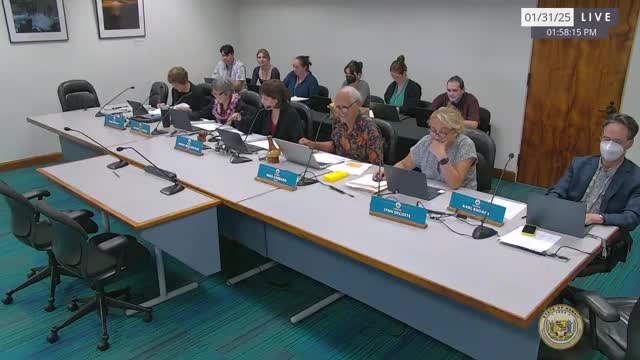Senators hear testimony supporting UH wastewater technology testing pilot with $750,000 request

Summary
Senators convening the joint Senate committee on Higher Education and Agriculture and Environment on Jan. 31 heard testimony supporting Senate Bill 1232, which would establish a three-year wastewater technology testing pilot at the University of Hawaii Water Resources Research Center and appropriate roughly $705,000–$750,000.
Senators convening the joint Senate committee on Higher Education and Agriculture and Environment on Jan. 31 heard testimony supporting Senate Bill 1232, which would establish a three-year wastewater technology testing pilot at the University of Hawaii Water Resources Research Center (WRRC) and appropriate roughly $705,000–$750,000 to run it.
Proponents said the center would accelerate local certification of new wastewater systems and help find lower-cost alternatives to cesspool conversion. "The department stands on its written testimony in support of it," said John Nagato for the Department of Health. Jio Wang, assistant professor with the Water Resources Research Center and the University of Hawaii College of Engineering, said, "I think this is a great platform for education, research, and also accelerating the adaptation of new technology in wastewater treatment, in Hawaii." Ted Bohlen of the Hawaii Reef and Ocean Coalition said the program could help identify cheaper solutions as Hawaii faces the need to address tens of thousands of cesspools.
Why it matters: The bill aims to provide an in-state, lower-cost testing pathway for vendors and technologies that otherwise would rely on National Sanitation Foundation (NSF) testing on the mainland, which witnesses said can cost hundreds of thousands of dollars. Proponents argued that an affordable local testing center could reduce per-unit costs for homeowners and accelerate adoption of alternatives to cesspools.
Details and questions from senators: WRRC provided a draft budget of about $705,000–$750,000 for three years, with most funds allocated to project management, graduate students and lab supplies. Jio Wang said the center would act primarily as a third-party tester for vendor-supplied systems rather than run independent basic research: companies would submit systems for performance testing at local wastewater plants. Witnesses said they had tentative approval to use a local wastewater plant as a testing site and that the prior informal testing effort had slowed after a key staffer left the university. Testimony referenced National Sanitation Foundation standards and said Hawaii Administrative Rules require either NSF or equivalent university testing to support Department of Health approvals.
Senators pressed on how long the pilot would last and on the center's sustainability. Wang said the three-year appropriation is intended to establish the platform and that, afterward, vendors could reimburse testing costs. Committee members also asked for historical reports and sampling data tied to past testing; witnesses said some earlier reports exist from the late 1990s and early 2000s but that capacity waned after the departure of a key researcher.
Limits and next steps: Witnesses did not propose a specific long-term funding source; Chair Kim noted agencies often include language supporting measures "as long as they do not supplant priorities" and asked where appropriated funds should come from. No formal action or vote occurred during the hearing; the committee moved on to the next measure after testimony and questions.
Ending: Senators indicated they may request supplemental data from DOH and WRRC, including past testing reports and more precise long-term funding proposals, before decision making.

